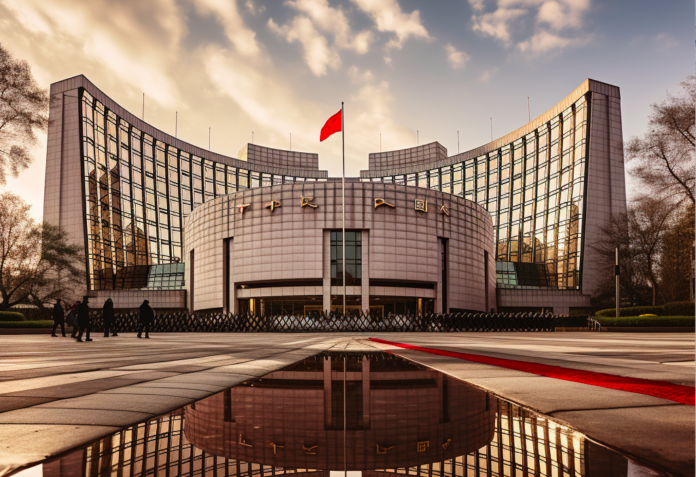The Chinese government held its quinquennial Central Financial Work Meeting (中央金融工作会议) (formerly the National Financial Work Meeting) from 30 – 31 October in Beijing, sending key signals as to the future direction of financial sector policies.
The Meeting is considered the highest-level gathering of the Chinese government on policy concerning the financial sector, and has been held once every five years since 1997, with the last event convened in July 2017.
In a speech delivered at the meeting, President Xi Jinping said that “scientifically answering a series of key theoretical and practical questions on the development of finance is a major component of Xi Jinping economic thought, and a key innovative outcome of Marxist political-economy on financial issues.
“[It] provides a basic compass for action for driving high-quality financial development in a new era.”
The eight defining traits of financial growth with Chinese characteristics
The meeting outlined the unique features of “financial growth with Chinese characteristics,” as embodied by what it referred to as the “Eight Upholds” (八个坚持).
Chief amongst these features is the leadership of the Communist Party of China (CPC), in tandem with the need to control risk, and service the real economy.
These eight features include:
- Upholding focused, unified leadership of financial work by the party central committee.
- Upholding the value-orientation of making people the focus.
- Upholding the fundamental mission of finance servicing the real economy.
- Upholding the prevention and control of risk as the constant theme of financial work.
- Upholding the innovative development of finance on the path of marketisation and the rule of law.
- Upholding the deepening of supply-side structural reform of finance.
- Upholding overall coordination of financial opening and security.
- Upholding the overall key work theme of seeking progress amidst stability.
Strengthening party leadership of finance
This year’s meeting placed heavy emphasis upon the role of the CPC in exercising centralised leadership of financial policy work.
This was signalled by a pivotal adjustment to the name of the event itself. 2023 marks the first time that the meeting has been referred to as a “central” as opposed to a “national” gathering.
Wen Bin (温彬), chief economist with China Minsheng Bank, says the move signifies a shift to “the party central committee [exercising] focused and unified leadership of financial work.”
The need for the CPC to exercise leadership of financial work also ranks first on the list of eight key traits of “financial work with Chinese characteristics.”
“Strengthening the focused and unified leadership of the CPC central committee converts political and systemic advantages into effective financial administration,” said the state-owned Xinhua News Agency.
“It makes use of China’s prior successful experiences in the reform and development of finance, and is also a fundamental guarantee of the effective performance of financial work in a new era.”
In March of this year, the CPC Central Committee and the State Council jointly released the “Party and State Institutional Reform Plan” (党和国家机构改革方案), which outlined the establishment of the Central Financial Work Committee (中央金融工作委员会).
The Meeting pointed to the committee as a key means for the CPC to exercise leadership of financial policy work in China.
It called for “effectively making use of the role of the Central Financial Work Committee, as well as “effectively making use of the role of local government financial committees and financial work committees.”
Transforming China into a “great financial power” by stepping up regulation
In addition to stressing the need for centralised party leadership, the Meeting highlighted Beijing’s ambitions to transform China into a “great financial power.”
“Finance is a great matter for the nation,” said the state-owned Xinhua News Agency. “It relates to the overall condition of Chinese-style modernised development.
“In order to make the transition from a major financial power into a great financial power…it is still necessary to invest even greater effort.”
To this end, the meeting set the goal of “accelerating the development of a great financial power,” as well as “making high-quality financial development the main theme.”
In stark contrast to free market advocates in other parts of the world, however, the Chinese government stressed the necessity of stronger and more “comprehensive” regulation to ensure the healthy functioning of the financial sector.
The Central Financial Work Meeting stated that “economic and financial risks and hidden dangers remain numerous” and “financial regulation and administrative ability is still weak.”
In order to deal with these issues, it called for “making comprehensive strengthening of regulation and the prevention and dissolution of risk the key points.”
Related measures will include:
- Raising the effectiveness of financial regulation.
- Promptly disposing of risk at small and medium-sized financial institutions.
- Establishing long-term effective mechanisms for preventing and dissolving local government debt risk.
- Expediting positive cycles between finance and real estate.
- Maintaining the stable operation of financial markets.
The measures outlined by the Central Financial Work Meeting are in line with recent statements and policy announcements by both regulators and President Xi in recent years.
Financial regulators have recently stressed the need to “lawfully include all financial activities within the purview of regulation,” particularly around the time that the initial public offer of Ant Group (formerly Ant Financial) was shelved in 2020.
In recent speeches, Xi has called for “pragmatically making financial security a major matter for national governance,” as well as stated that “preventing and resolving financial risk, and in particular the prevention of systemic financial risk, is the fundamental mission of financial work.”




